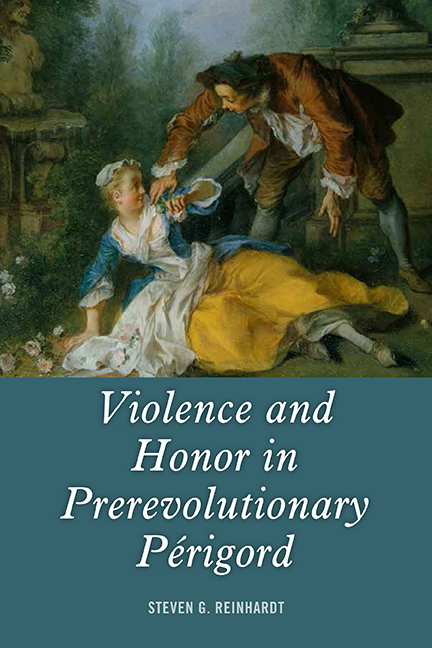Book contents
- Frontmatter
- Dedication
- Contents
- Acknowledgments
- Maps
- Introduction: “The Saint of Honor”
- 1 Violence and Honor
- 2 Honor in a Cross-Cultural Context
- 3 From Honor to Honnêteté in Old Regime Europe
- 4 “The Good Old Days” in Prerevolutionary Sarladais
- 5 “The Saint of Honor” in the Sénéchaussée of Sarlat
- 6 Women and Honor-Related Criminal Affaires
- 7 Policing Honnêteté: Shameful, Sinful, and Criminal Conduct
- 8 “Fallen Women” and Infanticide
- 9 Compromised Honor and Dangerous Liaisons
- 10 Honor and Homicide
- Conclusion
- Notes
- Bibliography
- Index
Introduction: “The Saint of Honor”
Published online by Cambridge University Press: 10 June 2021
- Frontmatter
- Dedication
- Contents
- Acknowledgments
- Maps
- Introduction: “The Saint of Honor”
- 1 Violence and Honor
- 2 Honor in a Cross-Cultural Context
- 3 From Honor to Honnêteté in Old Regime Europe
- 4 “The Good Old Days” in Prerevolutionary Sarladais
- 5 “The Saint of Honor” in the Sénéchaussée of Sarlat
- 6 Women and Honor-Related Criminal Affaires
- 7 Policing Honnêteté: Shameful, Sinful, and Criminal Conduct
- 8 “Fallen Women” and Infanticide
- 9 Compromised Honor and Dangerous Liaisons
- 10 Honor and Homicide
- Conclusion
- Notes
- Bibliography
- Index
Summary
Following almost a half-century of turmoil after the Revolution had begun, the bishop of the Diocese of Périgueux asked the curés in 1838 to report on the moeurs of their parishioners. In response, curés remarked that the inhabitants of the former province were “peu civilisés” and not very interested in religion; some few conceded that the inhabitants could be remarkably peaceful, honnêtes, welcoming, and hospitable. Overall, however, the experience of most Périgourdin curés inclined them to be less generous; they emphasized that their parishioners’ pugnacious conduct left much to be desired: “In general, the people are very proud and very demanding. Barely civilized in their mores, [they are] often vindictive, and almost always jealous of their relatives and neighbors. Moreover, they are excessively avaricious and never help anyone without expectation of personal gain.” Several curés commented on the peasants’ litigiousness, but the curé of Berbiguières reported that many of his parishioners preferred mediation by the curé or mayor. The curé of Notre-Dame-de-Sanhilac (commune of St.-Pierre-de-Chignac) did not perceive these alternatives as mutually exclusive and concluded, “The moeurs of the inhabitants of Notre Dame are crude, very crude. Envy, jealousy, and hatred dominate them; avarice is their master. Their habits and customs are obviously irreligious. One recognizes among them only a very mechanical observation of religion.” Nonetheless, he acknowledged that they were basically “docile.”
In Cubjac (Périgueux), the parish priest characterized his parishioners as “proud, irascible and extremely jealous.” These traits “strongly incline them towards vengeance, but their fear of pecuniary fines causes them to search judicial means of gaining satisfaction for their resentments. They are as litigious as Normans, and there are few communes that keep the tribunal at Périgueux as busy as does Cubjac.” Likewise, the curé from Miallet (Nontron) considered his parishioners to be proud, short tempered, truculent, and extremely solicitous of their honor.
The inhabitants of Miallet mix admirable qualities with great faults. They are naturally malicious, but they give themselves over to good as easily as to harm. Depending on the circumstances, they can be generous, compassionate [and] charitable, just as they can be vindictive, enraged and carried away, but then switch suddenly from hate to love. Simple honnêteté makes them supple and easy to influence; they are easily attracted to novelties… . They are inclined towards domination.
- Type
- Chapter
- Information
- Violence and Honor in Prerevolutionary Périgord , pp. 1 - 8Publisher: Boydell & BrewerPrint publication year: 2018



